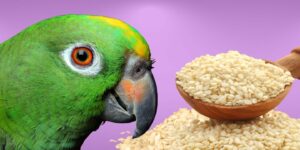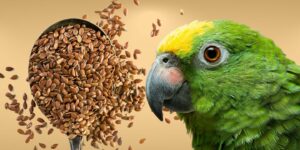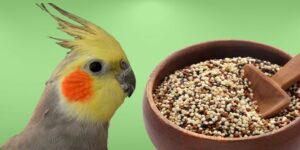Yes, birds can eat sunflower seeds. In fact, sunflower seeds are a popular food choice for many species of birds, including finches, sparrows, and chickadees. These seeds are high in fat and protein, making them an excellent source of energy for birds. It is important, however, to feed sunflower seeds in moderation and to provide a diverse diet for the overall health and well-being of birds.
Types of Sunflower Seeds
There are several types of sunflower seeds that can be fed to birds, including:
Black-oil sunflower seeds
These seeds have a high oil content, which makes them a popular choice for feeding birds. The thin shell is easy for smaller birds to crack open, allowing them to access the nutrient-rich seed inside.
Striped sunflower seeds
Striped sunflower seeds have a thicker shell than black-oil seeds, making them more difficult for small birds to eat. However, larger birds like cardinals and grosbeaks enjoy these seeds as a nutritious snack.
Hulled sunflower seeds
Also known as sunflower hearts, hulled sunflower seeds are seeds without their shells. These seeds are an excellent choice for birds that have difficulty cracking open seeds, like young birds or smaller species.
Benefits of Sunflower Seeds for Birds
Sunflower seeds provide a range of benefits for birds, including:
High energy source
Due to their high fat and protein content, sunflower seeds offer birds an important source of energy, particularly during periods of increased activity, such as migration or nesting.
Attracting various bird species
Sunflower seeds are favored by many species of birds, making them an ideal option for attracting a diverse range of birds to your garden or feeder.
Supporting bird health and well-being
The nutrients found in sunflower seeds, including vitamins and minerals, can contribute to maintaining a healthy bird population in your area.
Precautions and Tips for Feeding Sunflower Seeds to Birds
When feeding sunflower seeds to birds, it is important to consider the following:
Avoid feeding salted or flavored sunflower seeds
Salt and added flavors can be harmful to birds, so it is vital to provide only unsalted, unflavored seeds.
Monitor and control portion sizes
Sunflower seeds are high in calories and fat, so be mindful of portion sizes to prevent overfeeding.
Provide a diverse diet
As with any food, sunflower seeds should not be the sole source of nutrition for birds. Feed a range of seeds, fruits, and vegetables to ensure a balanced diet.
Keep feeders clean and hygienic
Regularly clean your bird feeders to prevent the spread of disease and maintain a healthy environment for your feathered visitors.
Be aware of potential pests attracted to sunflower seeds
Sunflower seeds can also be a food source for rodents and insects, so be sure to store seeds securely and monitor feeders for any signs of unwanted guests.
Alternative Foods for Birds
In addition to sunflower seeds, consider providing a range of different food types for birds, such as:
- Safflower seeds
- Nyjer seeds
- Peanuts
- Millet
- Suet
Attracting Birds with Sunflower Seeds
To create a bird-friendly environment, consider:
Choosing the right feeder
Select a feeder that accommodates the bird species you want to attract, and consider using multiple feeders with different types of seeds.
Combining sunflower seeds with other bird-friendly foods
Mix sunflower seeds with other seeds, fruits, or nuts to create a diverse and nutritious offering for birds.
Providing a bird-friendly habitat
Create a welcoming environment by providing birdhouses, nesting materials, and access to clean water.
Environmental Impact of Sunflower Seed Production
Keep in mind the environmental impact of sunflower seed production when purchasing seeds:
Agricultural practices and sustainability
Choose sunflower seeds that have been produced using environmentally-friendly practices, such as reduced pesticide use or organic farming methods.
Supporting local and organic sunflower seed producers
By purchasing from local growers or organic producers, you can help support sustainable agriculture and minimize the environmental impact of transporting seeds long distances.
Frequently Asked Questions
Can wild birds eat sunflower seed shells?
While some birds may consume small amounts of sunflower seed shells, they provide little nutritional value and can be difficult for birds to digest.
How to store sunflower seeds for birds?
Store sunflower seeds in a cool, dry place, away from direct sunlight, and in a rodent-proof container.
Are sunflower seeds safe for pet birds?
Many pet birds can safely consume sunflower seeds. However, it is essential to consult a veterinarian and provide a balanced diet suited to your pet's specific needs.
Conclusion
Feeding sunflower seeds to birds can be a rewarding way to support local wildlife and promote a healthy, thriving bird population. It is essential to practice responsible bird feeding by providing a diverse diet, keeping feeders clean, and considering the environmental impact of sunflower seed production. By doing so, you can help create a bird-friendly environment and enjoy the many benefits that come with welcoming birds to your garden or yard.







